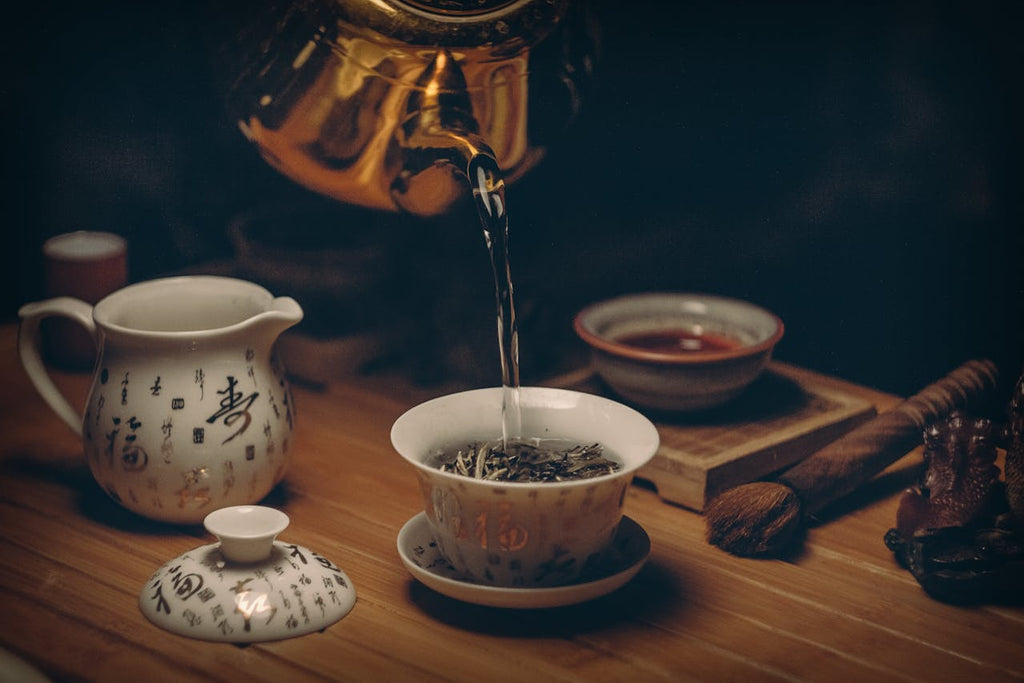
Tea, one of the world's oldest and most beloved beverages, offers more than just a comforting warmth or a refreshing pause in your day. It's a drink steeped in history, full of health benefits that modern science is only just beginning to fully understand. From the antioxidant properties of green tea to the soothing effects of chamomile, each variety presents its own set of perks.
In this article, I’ll explore the reasons why making tea your drink of choice can be beneficial for both your mind and body, making a case for its daily inclusion in your routine.
Antioxidant Powerhouse
Green tea, in particular, is lauded for its high concentration of antioxidants, which are compounds that fight against oxidative stress and cellular damage in the body. These antioxidants, such as catechins, are not only effective in neutralizing harmful free radicals but are also associated with a reduced risk of chronic diseases, including cancer, heart disease, and type 2 diabetes. Integrating a cup or two of green tea into your daily regimen can bolster your body's natural defense system, promoting overall health and longevity.
Stress Reduction and Mental Wellbeing
Among the numerous benefits of tea, its ability to reduce stress and promote mental well-being stands out. Herbal teas like chamomile are well known for their calming effects, which can help alleviate symptoms of anxiety and improve sleep quality. The routine of brewing and sipping tea itself can also serve as a meditative and mindful practice, offering a peaceful respite from the hustle and bustle of daily life. For those seeking a natural way to unwind and relax, a cup of herbal tea might just be the perfect remedy.
Supports Weight Management
Tea, especially green tea, has been associated with weight management and even weight loss. The compounds found in green tea can help boost metabolic rate, increase fat oxidation, and enhance exercise performance, thereby supporting weight management goals. Unlike sugary beverages or high-calorie coffee drinks laden with cream and sugar, tea is a low-calorie option that can satisfy your thirst without compromising your health goals. Incorporating it into your diet can help maintain a healthy weight and support a balanced lifestyle.
Hydration and Digestive Health
Despite common misconceptions, caffeinated teas such as black tea can contribute to your daily fluid intake, helping to keep you hydrated. Additionally, certain types of tea are beneficial for digestive health. For instance, ginger tea can alleviate nausea and improve digestion, while peppermint tea is known for its ability to soothe the stomach and relieve digestive disorders such as irritable bowel syndrome. Drinking tea can support not only hydration but also a healthy digestive system, making it a worthwhile addition to your daily routine.
The Lure of Green Tea
The appeal of green tea extends far beyond its role as a traditional beverage; it is a symbol of culture, health, and rejuvenation. Cultivated primarily in Asia, but enjoyed worldwide, green tea offers a subtle yet complex flavor profile that can vary greatly depending on its region of origin, processing methods, and preparation techniques. This versatility makes it a favorite among connoisseurs and casual drinkers alike. Beyond its gustatory pleasures, drinking green tea is renowned for its potential health benefits. Rich in polyphenols, particularly epigallocatechin gallate (EGCG), it offers antioxidant properties that have been linked to improved brain health, fat loss, and a lower risk of heart disease. Its moderate caffeine content also provides a gentle energy boost, making it an excellent alternative to coffee for those seeking a less jittery lift. Whether enjoyed for its flavor, its ceremonial significance, or its health-giving properties, green tea occupies a cherished place in the hearts and cups of many.
Oolong Tea: The Best of Both Worlds
Oolong tea, a traditional Chinese tea that is partially fermented, cleverly bridges the gap between green tea and black tea. Its unique processing involves withering the plant under strong sun and oxidation before curling and twisting. This special method gives oolong tea a distinct flavor and a fruity, fragrant aroma that's more robust than green tea but milder than black tea. Oolong is prized for its numerous health benefits, including improving heart health, aiding in weight management, and reducing stress. Its antioxidant properties and moderate caffeine level make oolong an excellent choice for those seeking a flavorful yet beneficial tea experience.
Black Tea: Bold and Robust
Black tea is the most intensively processed variety, fully oxidized, which gives it its dark color and rich flavor. Known for its boldness, it's the basis for many popular blends, including Earl Grey and English Breakfast. Beyond its strong taste, black tea offers significant health benefits. It contains antioxidants known as theaflavins and thearubigins, which have been linked to reducing cholesterol levels and improving heart health. Regular consumption of black tea can also help with stress relief due to its lower caffeine content compared to coffee. Its robust flavor and health-promoting qualities make it a revered choice amongst tea drinkers around the globe.
White Tea: Delicate and Pure
White tea, known for its delicate and subtle flavor, is the least processed of all tea varieties. Made from the young leaves and buds of the tea plant, white tea is minimally processed and dried naturally, often in sunlight. This gentle processing helps retain high levels of phytochemicals that can benefit health, including impressive antioxidant properties that may reduce the risk of heart disease and combat skin aging. White tea is also the perfect choice for those looking to enjoy tea's natural flavors without the strong aromatic presence found in green or black varieties. Its light and sweet taste profile, along with its health benefits, make white tea a luxurious and beneficial beverage option.

The Tradition of Tea Drinking
Tea is not just a beverage; it's a global tradition that brings people together. Many cultures around the world have their unique tea ceremonies and rituals, showcasing the deep cultural significance and communal aspect of tea drinking. These ceremonies are not only about the act of preparing and consuming tea but are also imbued with meanings of hospitality, social interaction, and respect. Some notable tea traditions include
- The Japanese Tea Ceremony, known as Chanoyu, focuses on the aesthetics of tea preparation and serving, emphasizing harmony, respect, purity, and tranquillity.
- In China, Gongfu Tea Ceremony highlights the skillful art of tea preparation, offering a meditative experience to both the server and the receiver.
- Afternoon Tea in the United Kingdom is a quintessential ritual that combines tea drinking with a light meal composed of sandwiches, scones, and pastries.
- Moroccan Mint Tea ritual, where tea is poured from a height to create foam, symbolizing a warm welcome to guests.
These traditions reflect the diverse ways in which tea is woven into the social fabric of various cultures, making it a symbol of hospitality and community worldwide.
Health Benefits of Herbal Teas
Herbal teas, often not derived from the traditional Camellia sinensis plant, are a treasure trove of health benefits, each blend offering unique properties. Unlike their caffeine-containing counterparts, herbal teas like rooibos, chamomile, and hibiscus are naturally caffeine-free, making them an excellent choice for those seeking to reduce their caffeine intake.
Rooibos tea, for instance, is rich in antioxidants and has been linked to heart health and diabetes prevention. Chamomile is renowned for its calming properties, aiding in better sleep and stress reduction. Hibiscus tea, with its vibrant color and tart flavor, may help lower blood pressure and support liver health. The diversity in flavors and health benefits make herbal teas a versatile and therapeutic part of any diet.
Tea's Role in Cultivating Mindfulness and Community
Tea drinking transcends the simple act of consuming a beverage; it can be a mindful practice that promotes a sense of peace and presence. The ritual of preparing tea—selecting the leaves, boiling the water, and patiently waiting for it to steep—encourages a moment of pause in our often hectic lives. This intentional slowdown allows for a mindful connection to the present moment, fostering a meditative mindset that can reduce stress and enhance overall well-being.
Furthermore, tea acts as a conduit for community and connection. Whether it's a family gathering around a pot of tea in the afternoon or friends sharing a quiet moment at a local tea house, the act of drinking tea together fosters a sense of belonging and shared experience.
In this way, tea serves not just as a drink, but as a powerful tool for cultivating mindfulness and nurturing relationships.
Why Should Tea Be Your Go-To Drink?
Tea is more than a mere beverage.
It is a rich concept bringing together the best from history, culture, and health. Across the globe, tea symbolizes a myriad of traditions that embody the spirit of hospitality, community, and the simple joy of sharing a moment of tranquillity. Tons of health benefits associated with the various types of tea—from green to black, oolong to herbal—are a testament to its enduring legacy as a staple of wellness.
Whether you're seeking the antioxidative prowess of green tea, the calming ritual of chamomile, or the communal joy found in the traditional tea ceremonies, there's a place for tea in every aspect of life. Its ability to connect us to the present, to each other, and to the cultures from which it originates, ensures that tea remains a cherished beverage for generations to come.
For health and fitness updates and discounts, subscribe to our newsletter.
